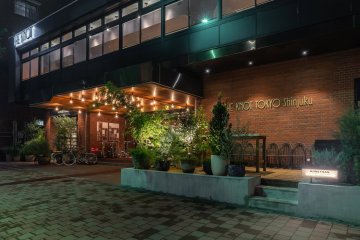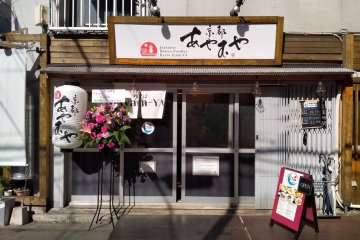![J-World, Parc à Thème Manga, Tokyo [Fermé] J-World, Parc à Thème Manga, Tokyo [Fermé]](https://a3.cdn.japantravel.com/photo/13683-79386/360x240!/tokyo-j-world-tokyo-indoor-theme-park-79386.jpg)
J-World, Parc à Thème Manga, Tokyo [Fermé]
Lynnette CantosLancez-vous dans une aventure interactive avec vos personnages préférés de Shōnen Jump au J-WORLD de Tokyo, situé au centre commercial Sunshine City à Ikebukuro.

Sunshine City is Ikebukuro's own "city within a city". The complex offers living, work, shopping, and entertainment all on its large grounds. Sunshine City is located in East Ikebukuro, near Ikebukuro Station. There are four main buildings that make up Sunshine City: Sunshine 60, Prince Hotel, World Import Mart, and Bunka Kaikan.
Sunshine 60 is the main building of Sunshine City and houses Ikebukuro's own observatory called Sky Circus. Other Sunshine City attractions include Sunshine Aquarium, a planetarium, an Ancient Orient Museum featuring Greco-Buddhist artworks, a Namco-run amusement center, as well as other minor attractions. The lower floors of Sunshine City cater to shoppers and sightseers, while the upper floors are reserved for office workers and hotel guests.
10-minute walk from Ikebukuro Station
![J-World, Parc à Thème Manga, Tokyo [Fermé] J-World, Parc à Thème Manga, Tokyo [Fermé]](https://a3.cdn.japantravel.com/photo/13683-79386/360x240!/tokyo-j-world-tokyo-indoor-theme-park-79386.jpg)
Lancez-vous dans une aventure interactive avec vos personnages préférés de Shōnen Jump au J-WORLD de Tokyo, situé au centre commercial Sunshine City à Ikebukuro.

L’Aquarium Sunshine est situé à Ikebukuro à Tokyo et offre aux visiteurs un aperçu du monde sous-marin. Il est situé sur deux étages dans la partie s...

Situé à deux pas de l'immense parc central de Shinjuku, THE KNOT TOKYO Shinjuku est un hôtel moderne de caractère avec un accès facile à la gare de Shinjuku et au sanctuaire Meiji. Le bâtiment de l'hôtel de 14 étages a été rénové et rouvert sous le nom de THE KNOT TOKYO Shinjuku en août 2018. La conception de l'atrium spacieux offre une atmosphère détendue et relie le restaurant, le bar, le salon et le hall les uns aux autres. L'hôtel dispose de plus de 400 chambres et 7 types de chambres et au dernier étagent se trouvent des chambres de style occidental offrant une vue sur le parc ainsi qu'une suite avec terrasse récemment ouverte. L'un des points forts de THE KNOT est sa délicieuse cuisine. Vous y trouverez six zonesde restauration, proposant par exemple des grillades au thé noir de qualité ou du pain frais.

NOHGA HOTEL AKIHABARA TOKYO is conveniently located in the midst of the electric town Akihabara, also known as the capital of manga and anime. In addition, this neighborhood has an abundance of tech shops, maid cafes and a variety of restaurants. With just a 6-minute walk away from Akihabara station, it provides easy access to explore other areas nearby such as Ueno and Asakusa. This hotel embodies the rich cultures of music, art and food. Nohga’s concept of music is derived from Akihabara’s local history, starting as a district of radio and wireless component merchants in the late 1920s. The artistic and luxurious space throughout the hotel is achieved by featuring art and amenities designed in collaboration with craftsmen from around Japan. As for the food menu, it’s seasonal fresh ingredients are sourced domestically. The glasses and dinnerware served are collaborations with stores in the surrounding area. All 120 non-smoking guest rooms feature an ensuite bathroom with a rain shower, in-room safety box, mini fridge, USB plugs, free Wi-Fi, a high-quality bluetooth speaker and flatscreen TV with original music and film. The lounge area and a compact 24-hour gym can be found near the reception on the second floor. Services include laundry (from 2,750JPY) and a 24-hour front desk with a check-in time of 3PM and check-out time of 11AM. For sightseeing you can rent a Tokyobike for the day (2,000 JPY/day) to explore the vicinity.

With Koenji being a "creative town" it's no surprise that the BnA Hotel opened there in 2016 and has had, subsequently, an incredible impact on the local community. BnA (Bed and Art) has other spaces dotted about Tokyo and Kyoto, but the Koenji edition is possibly more immersive as the concept is "stay in an artwork." In collaboration with local artists, the BnA has created an impressive multi-storey art experiment for art lovers and creatives with a desire to inhabit art. The first floor acts as a front desk and bar which comes alive at night with events and selected DJs. It also hosts Masu Masu onigiri cafe with artists being asked to come and exchange artwork with each other in a gesture which reflects the true spirit of Koenji. With two "living art" twin rooms taking up the second and third floors designed by a seasonal rotation of local artists, guests can engage with and inhabit their art rooms. BnA Koenji also plays host to a rooftop lounge and a basement space which is used for artists residencies where their work is shown to the public and a DJ booth and streaming equipment for live performances. With live painting events and an eclectic variety of regular events, the BnA Hotel becomes, itself, a living canvas. The BnA believes that it's a machigata hotel, meaning that guests should (and are encouraged) to interact with Koenji. Use the public sentos, eat in the local restaurants that surround the hotel and buy locally from the multitude of shops, market stalls, bars and cafes which make-up the fabric of Koenji. Feted by international press such as The Guardian, BnA acts as a creative network with the concept of serendipity being discussed as the bar becomes an ad hoc meeting place where collaborations and friendships between artists and locals are born. The BnA was also instrumental in a street art festival named MCP (Mural City Project) which was supported by Suginami Ward. MCP was incredibly ambitious and truly communal with the desire to transform and coalesce the community through the creation of public murals. The BnA, Koenji and Suginami spearheaded a public art movement which should be commended and replicated throughout Tokyo.

Bunny Cafe Moff Rell in Tokyo's Chiyoda Ward offers a chance to interact with adorable rabbits. You can make reservations for the cafe by phone, or you can visit and pay at the store before entering. The cafe provides 30- and 60-minute courses, and you can play with or feed the bunnies. If you are unsure about how to treat the rabbits, don't worry! The staff members will kindly explain everything to you. Minimum age is 10 years old.

PIZZERIA & BAR NOHGA is an all day dining restaurant interpreting a fusion of “Spanish Italian” cuisine and has a kitchen to table design. There is a casual bar area and restaurant where you can take a peek inside the open kitchen whilst enjoying your meal. Visit the cafe for a range of coffees and teas along with an offering of tapas snacks and seasonal desserts. The cafe also offers an assorted dessert and all-you-can-drink cafe set. Breakfast takes on the art of sharing, where a range of platters are combined with focaccia and your choice of eggs cooked your way. Coming for lunch? Choose from a selection of pizzas, pastas and salads. Each lunch menu is accompanied with homemade soup, iced tea and focaccia. Dinner time offers a range of exquisite tapas and pizzas that can also be shared. Breakfast: 07:00 - 10:00, Lunch 11:30 - 14:30, Cafe 14:30 - 18:00, Dinner: 18:00 - 23:00 with last order at 10pm.

Ayam-YA is a certified halal ramen restaurant found in the Okachimachi area of Tokyo, between Asakusa and Ueno, and not far from Assalaam Mosque. A sister branch in Kyoto also exists.

Waseda University, abbreviated as Sōdai, is a Japanese private research university in Shinjuku, Tokyo. Founded in 1882 as the Tōkyō Senmon Gakkō by Ōkuma Shigenobu, the school was formally renamed Waseda University in 1902. [Wikipedia]

Créé en 1695, ce jardin est un des plus connus de Tokyo. Il est particulièrement populaire en automne, ouvert en soirée pour des illuminations exceptionnelles.

Koishikawa Botanical Garden, located in Tokyo’s Bunkyo Ward, is a beautifully landscaped naturespace owned by Tokyo University. The garden dates back to 1684 when it was established as a medicinal herb garden for the Tokugawa shogun. The 16-hectare (40-acre) garden is home to 4,000 plant species and includes both a botanical garden and arboretum. In addition to being a public asset to the city, the garden also acts as an extension of Tokyo University where students and professionals can study and research plant life. The garden is also used to conserve and propagate endangered species. Aside from its educational applications, the garden is a popular spot to wander and admire nature. The thousands of tree and plant species, most of which originate in eastern Asia, are immaculately sculpted into a Japanese landscape garden, making for a pleasant stroll. Enjoy camellias, maple trees, bonsai trees, plum trees, and many more! The garden is an especially pleasant spot during cherry blossom season. Being less crowded than other venues, the garden is a relaxing spot to admire the dainty blossoms and features multiple cherry blossom species. Walk along cherry tree-lined paths or picnic under pastel petals. During autumn, visit the park to witness its vibrant red Japanese maple trees. Admission to the garden costs 500 yen for adults and 150 yen for children.